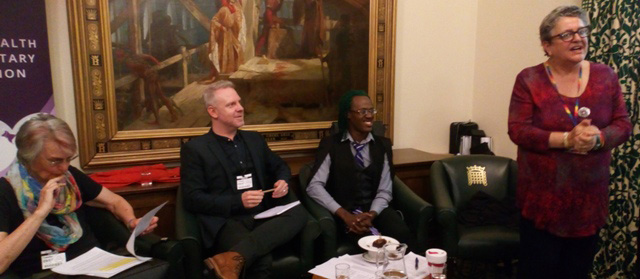By Debbie Ransome
Going beyond the basic storyline to dig deeper into the Haitian reality and how it gets reported, this

At the height of events to mark Pride Week in the UK, the Commonwealth Parliamentary Association (CPA) held a panel discussion at the Houses of Parliament to look at the LGBTQ+ lobby and the Commonwealth.
One of the panellists, Glenroy Murray of J-Flag (the Jamaican Forum for Lesbians, All-sexuals and Gays), put forward a Caribbean perspective on why his organisation sees such rights as bigger than LGBTQ+ issues.
J-Flag has long been heralded for its subtle approach in lobbying for respect for LGBT people. In December 2018, the UK’s Guardian newspaper said that their campaigning to “humanise” gay people had turned Jamaica around from being what Time magazine had described in 2006 as “the most homophobic place on Earth”.
The Guardian said that following J-Flag’s 1998 launch, the Jamaica Guardian had written that “we are being prepared to accept seeing two men kissing, holding hands or sharing popcorn from the same bucket at the movies. Public reaction has, however, been hostile… For the next few years, at least, gay rights in our society, as far as road marches or public appearances are concerned, is a very dim possibility.” The UK Guardian said that less than two decades later, J-Flag had made this “dim possibility” slightly brighter.
The Guardian summed up: “Three years ago, the country held its first pride event when a flashmob of 15 LGBT people gathered in Kingston’s Emancipation Park, dressed in the colours of the rainbow. Since then, Pride Week has grown: a beach party last year attracted 1,200 people. Pride celebrations have brought unprecedented visibility to the community. So has social media.”
Tackling ‘colonial standards’
Speaking at the CPA debate in July 2019, J-Flag advocate and adviser Glenroy Murray explained how this transition had taken place.
He said that given the nature of Jamaica’s laws, it would not make sense to challenge colonial laws on a human rights basis. He said that the “colonial standard” left by the British was still being unravelled in Jamaica in many ways, on issues from dress (a dark suit in a tropical country) to abortion to Obeah. “Colonialism really did a number on us Jamaicans,” Mr Murray told the CPA event.
The approach of J-Flag and their supporters, he said, had been to work towards a “better Jamaica”, rather work on a ”gay agenda”. He added that the J-Flag lobby was not about outsiders telling Jamaica what to do, but Jamaicans “interested in their Jamaican-ness”.
He outlined events organised by J-Flag, including beach clean-ups, sports days and Emancipation Day events – all part of what he described as tapping “into our culture” and “part of that de-colonisation”.
Mr Murray said that according to J-Flag surveys over the years, there had been a 5%-25% jump in more tolerant attitudes. He added that the LGBT community was “being taken more seriously” by the Jamaican government, describing the “largely positive” attitude from politicians today, even if they didn’t go public in their support.
Vigorous debate
The most recent suggestion by Jamaica’s justice minister to review and possibly repeal the country’s Obeah Act has been met by vigorous debate across media and church pulpits since June 2019, indicating the divided views still remaining on some of the Caribbean’s colonial laws.
Jamaica is not alone in the debate on facing down its colonial laws. In Trinidad & Tobago, an April 2018 High Court ruling striking down the section of law outlawing same-sex intercourse has been left in limbo following a September ruling which did not annul the legislation completely. And the Trinidad government announced plans to appeal against the ruling at the Privy Council in London – a process which has been known to take several years.
Mr Murray said that Jamaica and other parts of the Caribbean still had some way to go in terms of “de-colonising our minds”. In context, he pointed out that many of the laws on the region’s statute books in the days of the British Empire had been about an “English distrust of African beliefs” and attempts at “ensuring that black bodies were always controlled”.
Today, he sees “small pockets of support” and “more positive stories”. He said the LGBTQ+ community in Jamaica had been able to create more spaces where people could feel safe. He said they would continue to work on building community spaces. He told the CPA that they would also look at how to help politicians put their heads above the parapet on such issues.
“The situation’s not great, but it’s not that bad,” he told the Commonwealth parliamentarians.
By Debbie Ransome
Going beyond the basic storyline to dig deeper into the Haitian reality and how it gets reported, this
[photo: Patti Smith & Winston Rodney, cred Ted Bafaloukos]
In a year of global challenges and fall-out, we at Caribbean Intelligence© have focused on the aspirational side of Caribbean life.